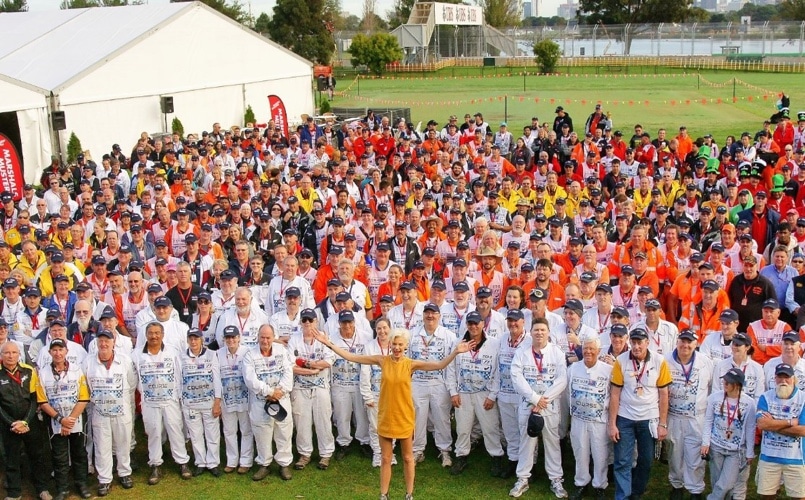 As the new Formula 1 season gets underway, take a race with me through my MBA journey. Over a series of articles, I will explore “between the lines” of my MBA journey, whether my MBA helped with my moves, and ‘was it all worth it?’.
As the new Formula 1 season gets underway, take a race with me through my MBA journey. Over a series of articles, I will explore “between the lines” of my MBA journey, whether my MBA helped with my moves, and ‘was it all worth it?’.
Half way through my program I made a move from track-side to corporate side. This wasn’t really a move I had planned when starting my MBA.
“I wrote my application letter whilst sitting in the dining cart of the Indian Pacific train crossing the Nullarbor Plain for the second time in as many years.”
The train ride was necessity more than holiday. I distinctly remember staring out the window of the gently rocking carriage, across the barren flat outback of Western Australia, with the sun setting and kangaroos on the horizon, thinking… “I don’t remember any Australian tourism advertisements that included writing a job application”. With no phone reception, it was actually not a bad place to be writing one. Upon arriving into civilisation, I sent my application to Jason and waited.
READ: From Race Tracks To Board Rooms…Was An MBA Worth It? Pt. 1
Jason is a fellow alumnus of my school. I was introduced to him by my strategy lecturer, Geoff. I attribute much of my career switch to Geoff. Some felt he was too strict when cold calling people out in class to provide an answer. I would typically retort “yeah but what’s worse, getting called on in class by Geoff and not having the answer… or, getting called on by your CEO or a customer and not having the answer?”. Most would answer, “Geoff”.
Geoff introduced me to Jason to bounce business concepts. I was contemplating a sports consultancy idea and whilst Jason didn’t have much interest in sport he was passionate about mentoring start-up founders (and still is). Jason and I met to discuss ways to build my business idea and to test my assumptions. I was so impressed by the way he took the time to meet with me, a potentially pesky student who he didn’t know. Over dinner we mused business models and how the consulting industry works. At the end of our conversation we shook hands and parted ways.
Networks and ping pong balls
Many months later, a job advertisement popped up on my LinkedIn feed. It caught my eye only because I recalled it was the firm Jason worked for. I clicked on the advertisement with curiosity. As I read, I remembered how positively Jason had spoken of the people and the projects he worked on. I reached out to Jason again, and again he was very giving of his time, explaining the role, his company and the downsides. I think this is one of the great things about having a network – the ability to ask about the negatives. Every organisation and role has them but they can be “sugar coated” or glossed over in recruitment campaigns or company websites.
For me, reaching out to learn about the day to day in the company was so valuable. The attributes are different industry to industry, role to role and country to country. Often the technical skills that we focus on are only part of the story. Do I need the ability to manage stakeholders? Work alone? Focus on detail? Be a visionary? Work under time pressure? Answer to multiple ‘bosses’? Travel? No travel? Lots of change? No change? Be on the forefront of new thinking? Be in a highly process or hierarchical system? Minimal formality? What is the work, life and family balance like?
“It’s great to be able to reach out and get the real dirt from someone you trust, and equally them trust you enough to be candid.”
This is one of the first things I encourage my friends to do when looking to make a career switch. This way they will do themselves justice in their search and short cut any misguided or completely wrong decisions. Who wants to get a few months into a role or partnership to discover that it is not the right fit, whether it be cultural, skills or some other reason. It’s a costly mistake for you and your employer or business partner. Whilst I was not looking for a career switch, armed with this information I felt convinced I should have a go. So, I did.
After applying for the role, I thought it appropriate to brush up on my case study skills. If there was one thing I knew, it was the pain of the case interview. When graduating from my Bachelor Degree I had a brief encounter with the profession – interviewing with Bain and also McKinsey. I rode the roller-coaster recruitment process with Bain through six back to back case interviews to the final three candidates, and received a, “no”. With this memory, I took myself to the Consulting Club at school. My recollection was right, case interviews are tough and at times down right horrific.
In addition to learning how to ‘estimate how many ping pong balls fit into a red car’ and ‘the potential global market size for hotel shampoo’ and a go to market strategy, I attended recruitment presentations by the other consulting firms visiting our school to learn what the industry looked like now.
Finally, my interview came around or multiple interviews as is the norm. My final round was a case interview with the Managing Partner and a senior consultant. My recollection of the interview is reading the case (it was a read and then respond approach) and smiling inside thinking I can pull material from my operations, marketing, strategy and finance classes straight away. The next 40 minutes was a blur of frantic scribbling and drawing across a massive whiteboard in a boardroom. I remember drawing a helicopter, and a soccer ball and using all the different coloured markers available. I had to deliver an approach and recommendation to be presented to the CEO of an aviation company. I don’t even remember what my end recommendation was. I do remember the curve ball questions coming out like, “your meeting with the CEO has just been cut in half due to a schedule change, what do you do now?”, and “how do you get those data points given this is only a prospective client so we do not have access to their files?”. I think I went with “prioritise” and “ask to do some staff interviews”, both of which I would go on to do many, many times in one shape or another in group work in my MBA program and during my consulting career.
How not to be a consultant
I’ll never forget walking in that very first day. This was definitely a different world for me. I actually didn’t even own enough suits for this amazing new job! Roughly four months earlier I had been standing track-side of the Australian Grand Prix with some of the most amazing volunteer officials I’ve ever had the privilege of working with; ears being blasted by the sound of race cars and radio blaring from Race Control.
As I stepped out of the lift on Level 10, I remember seeing the company logo and thinking, “the last time I was here I was drawing helicopters”. As I walked through the door it was all very real.
“The first few weeks felt a bit like learning a new subject at school. Chaos. Gather whatever info I could, draw on my research skills, lean on my friends and paddle as fast as I could up the proverbial creek.”
Lucky for me, there were quite a few alumni from my school including Jason, at the firm. All of them were quick to reach out and make sure I was holding my paddle the right way up.
During my first month at the firm I also started doing the subject Corporate Strategy. Each day during my first two weeks I would finish my day, manically run around the shops to find suits on sale then scamper home to read cases. I have no idea why I thought it was a good idea to start a new job in a new industry and take on what was typically known as one of the hardest subjects on offer. Ironically, this subject was with Geoff.
I somehow made it through that first month and the next five to pass my probation (and Corporate Strategy). I like to think as time went, even my paddling up the creek got a little straighter too. Thanks to everyone who helped that.
Who has made the biggest impact on your career?
In my next discussion, I will explore whether subject choices mattered.
About the Author










